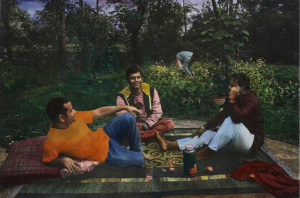Team L&M
Ages and ages of running after pleasure and instant gratification have dulled our very souls. We have traded simplicity for complexity, clean air for smog and machines for spirit. We have corrupted the soil we tread, the air we breathe and the water we drink. The consequences are here now, cutting holes into the very environment that surrounds us. We need to re-establish the link with nature.
It takes one a few moments to figure out whether it is an environmentalist or an artist you are meeting after hearing this statement about man and nature. Perhaps drawn towards a serious issue like this prompted Bangladeshi artist Manir Mrittik to compile 21 photographic prints and gold leaf, Natural Vessels, that is about the connection between man and nature.
In his debut solo show in India titled In The Realm of Ambivalence, Mrittik, 43, brings an aesthetically moving mix of magical realism and surrealism in over 40 photographic works that are showcased at Akar Prakar in New Delhi, from September 25 to October 20, 2018.

Theses photographic works by one of the most dynamic, young names on the Bangladeshi art scene kicks off a six-month-long season of cutting-edge Bangladeshi art in the National Capital.
“I’m interested in exploring beauty in human life as a part of nature in a dream-like manner. Digital cameras usually capture only the visible light for regular photography and only what the human eye can see. But I want to see MORE or LESS through my camera, like one would with ultraviolet, infrared or full spectrum light. There is no real line that separates us from nature. We were born from nature, we are a part of nature, and we live in nature. But strangely, we forget that link sometimes. The lines and contours of the body tell a story of their own,” says Britto Arts Trust member Mrittik.
Apart from Natural Vessels, The Lovers Redux by Mrittik is a five-piece photo tapestry work that explores notions of love and intimacy. Then there is a set of 10 hand-tinted photographic prints titled Raptures in Time & Space seek to express how history touches us as it passes by. But all these glimpses are always two-dimensional. They come to us as flattened images and compact words; efforts to condense an entire way of life into limited frames. However, artworks can create a certain connection with distant lands and distant times.
“It’s certainly transcendent how artwork can unify time and space. These works try to reflect on that a little bit, by unifying locations from the present day and images of the past. Our time here has also been extremely brief; superbly small compared to the history of the universe. The scale of our achievements has been humble, our footprints on time tiny. But even these small dents can make huge differences in the human soul,” shares the artist.
Alternative Masterpieces is a photo tapestry of four works that bring forth the notion of an invisible web that connects us all. They connect us with history and to those who made history. These threads of connection can be used to see familiar things in new ways and sometimes they can reveal layers that were hidden away. This work seeks to explore those webs that reach through time and space and help us find meaning and purpose. This work is an attempt to shed some light on threads that are usually invisible.
Venus Shattered is another photo tapestry of three pieces that reject the notion of quick, clean definitions of sexuality that have been hoisted on the modern era. “The concept of beauty has often been linked to sexuality. And although the idea of objective, ideal beauty has been questioned throughout history, the same kinds of questions have rarely been raised about sexuality. Our desires are messy, hazy, scattered things. And this work seeks to celebrate that. It reinterprets honours or references the works of the Great Artists of the past,” explains Mrittik.
Not-to-be-missed is The Sunflower Is Also Mine, which in a way, is a photographic performance. This project sprouted from a single seed, like a fully formed flower. “It always gives me pause when I think that I haven’t really ever seen Van Gogh’s Sunflower in person. But the history and the significance of those flowers carry a certain fragrance, a fragrance that is impossible for any artist with a good nose to resist. It was quite an experience walking in those old boots, sitting in that garden full of blazing flora. Here’s to the man whose head was on fire, the man who lived inside his paintings more than he lived outside them. His visions still float around us like petals in an afternoon breeze,” says Mrittik.